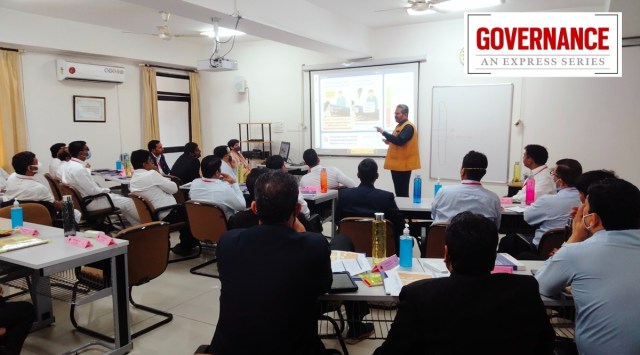From a board in Dadar to 1 lakh staffers, Railways makeover with eye on passengers
Officials said the Railways followed a hub and spoke method for this initiative, in a tie-up with third-party partner Illumine Knowledge Resources, under the Government's Mission Karmayogi.
 A training session at the Indian Railways Institute of Transport Management, Lucknow. (Express Photo)
A training session at the Indian Railways Institute of Transport Management, Lucknow. (Express Photo) Last year, a small board inside the Station Master’s room at the Dadar railway station in Mumbai was taken down. That board, saying “No enquiry please”, had been there for years to ward off passengers with queries about platforms, trains and even toilets.
“We used to think it was not our job. But not anymore,” says S K Singh, Deputy Station Master in Dadar. “Now, there is great satisfaction in helping people, in solving their problems. I respond instead of reacting, even if people ask the same question 10 times. The old irritation from routine work is missing. That’s the difference.”
Singh is among the around 1 lakh railway employees at stations — from booking and parcel clerks to TTEs and station masters — who are in customer-engagement roles and have completed the Government’s Rail Karmayogi training to make “public servants more empathetic and responsive towards citizens”.
Following the programme, a third-party audit of around 5,000 citizens and officials at stations in Mumbai, Lucknow, Asansol and Bengaluru were rated on four key parameters: service, professionalism, solution responsiveness and overall experience. Officials said the audit’s “Citizen Trust Scores”, finalised in December and released this month, were at least 1.5 times of what they were before the training was imparted. Only Lucknow, they said, scored marginally lower than before in one parameter – professionalism.
Officials said the Railways followed a hub and spoke method for this initiative, in a tie-up with third-party partner Illumine Knowledge Resources, under the Government’s Mission Karmayogi. It started with 1,157 employees attending five-day training stints in batches at the Indian Railways Institute of Transport Management in Lucknow from March to May last year to be certified as “Master Trainers”. In a parallel exercise, those who got certified passed on the lessons learned down the line to cover nearly 1 lakh employees in the programme through field exercises.
“Overall, the programme was good. It emphasised that we can derive joy out of helping people and not just doing our routine job,” said Manoj Gupta, secretary of the All India Station Masters’ Association who attended a field exercise as part of the initiative.
According to officials, some of the questions that laid the foundation for the training module included: “When did you get happiness in your job?”; “What is your inner reward in public service?”
Officials said the programme charted 22 touch points in a station where citizens interact with officials, and factored in situations that cause “friction” and “repeated irritation” like getting an unreserved seat, queues in ticket counters, availability of amenities, etc. It put the station masters through everyday situations, training them to deal with each differently — with empathy, and a motive to solve the problem, they said.
“This is called the Seva Bhaav (Service Mindset), which the Prime Minister spoke about in the Independence Day speech last year. To infuse a sense of duty and service in public servants. We have done it with Railways, and we have also done it with BSNL employees,” said Praveen Pardeshi, who is a member of the PM-constituted Capacity Building Commission, which is spearheading the project.
Following the Railways and BSNL, where around 7,500 employees were covered, the Post and Telegraph is expected to carry out similar training for its staff.
“Firstly, the intervention addressed the usual mindset of customer-facing government employees. There is ‘routinisation’ of the work, there is the ‘chalta hai’ mindset…they often forget why they are there in the first place, and then they are not clear how they can bring customer satisfaction. The training addressed that through what we call ‘discovery pedagogy’ wherein they discovered the answers to the questions themselves and were not given a lecture or advice,” said V Srinivas, CEO, Illumine.
He said the company has done similar exercises for the police in Union Territories, except Delhi.
Following the Railways programme, an online platform kept tabs on the follow-up training imparted by the “Master Trainers” in their divisions, with Railway Minister Ashwini Vaishnaw instructing all zones to take up the initiative.
The Railways, which is the country’s largest public utility service, has about 12 lakh employees and 7,200 stations that cater to about 23 million passengers every day on average.
“Employees in various stations keep sending reports on how they are helping passengers, like returning lost valuables, helping someone in labour pain, reuniting a lost child with family, etc. The training is about positivity in government-citizen interactions,” said Chandralekha Mukherjee, who was director-general of the railways institute in Lucknow, where the training was held.
However, the third-party audit also showed that not all citizen-official “flashpoints” could be addressed with a shift in the mindset of personnel at stations. It showed that long queues in ticket counters, lack of enough foot-overbridges, confusion over platform numbers and congestion continued to be “customer pain points”. The audit called them “systemic flashpoints”, which require design, capacity and infrastructure interventions.





- 01
- 02
- 03
- 04
- 05


























